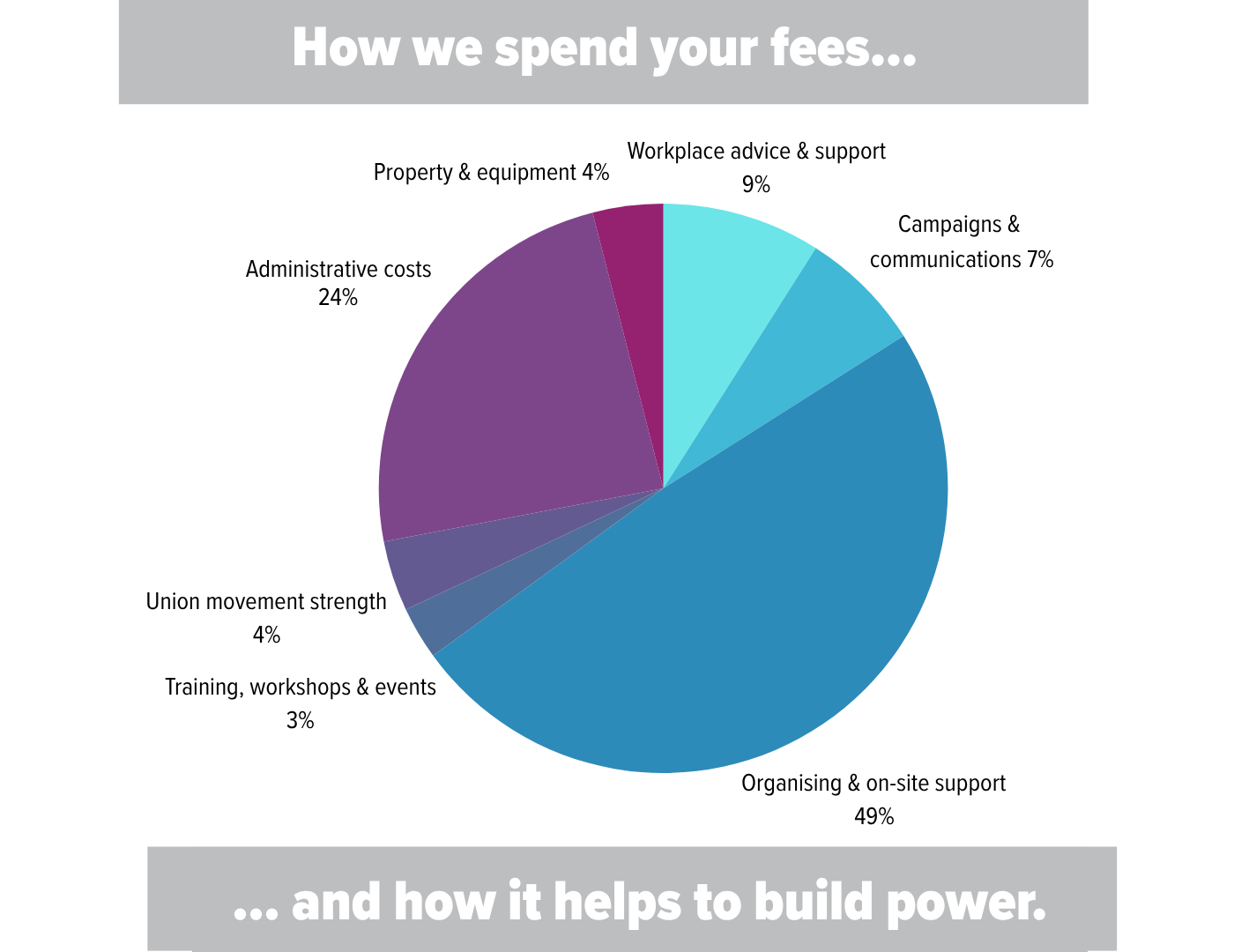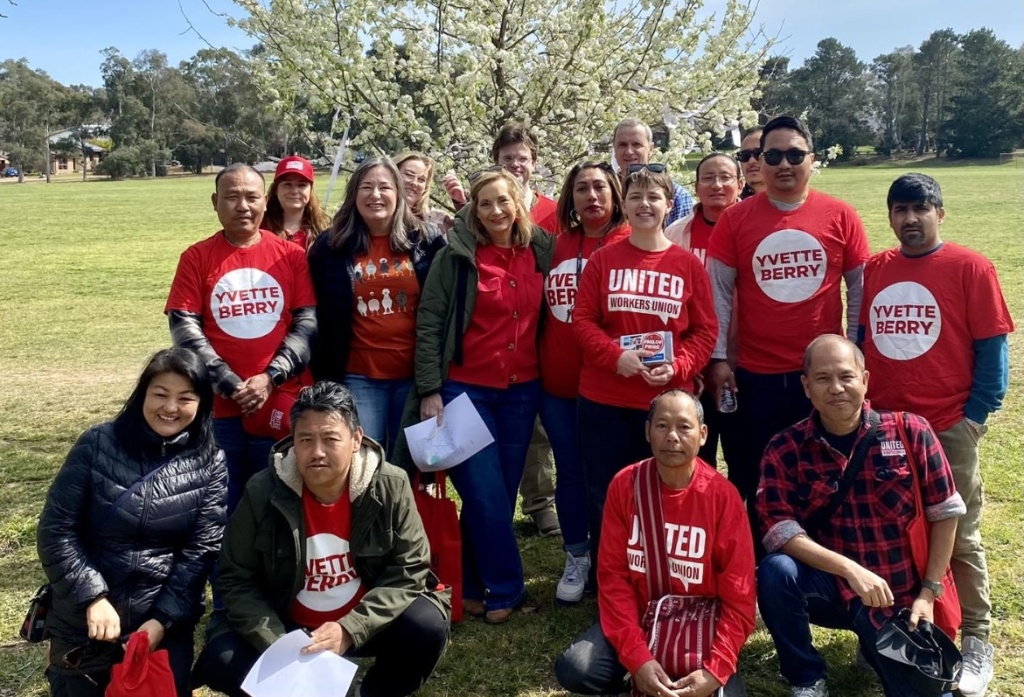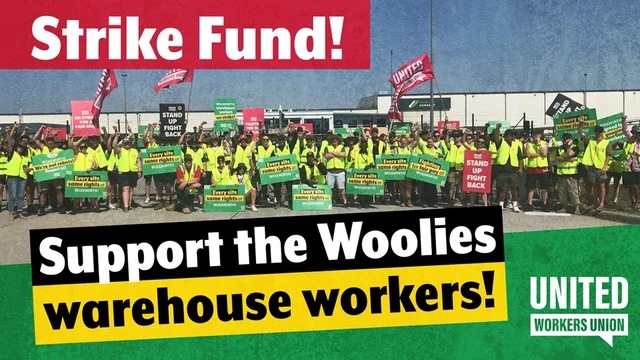If you’ve just joined, or you’re thinking of joining, or maybe you’ve been a long-time faithful member of the mighty United Workers Union – whatever your situation, you’re probably curious about how we spend your membership fees.

It’s a fair question, so we’ve done a budget breakdown to demystify how much is spent on what.
We’re all UWU members (including all of us who work for the union). So, no matter what industry you’re in, we all want to make sure our fees are never wasted and always put to good use.
All unions are not-for-profit organisations
Unions collect fees from members because, by everyone chipping in together, we can achieve way more as a group than you ever could alone.
We’re a union of over 150,000 members. That’s a lot of people power, and a fair bit of budget. And because we’re non-profit, you can be sure all our budget is put back into the organisation.
Our budget is enough to cover core union business and costs such as:
- Organising and on-site support
- Legal advice and representation
- Campaigns and communications
- Education and training
- Staffing and administration
We’ll talk about these activities and what’s involved in more detail below.
We participate in a range of other activities, such as campaigning for better wages and conditions for all minimum and award wage workers and supporting UWU members to stand for parliament. All this helps workers in more industries than we cover, here in Australia – and other parts of the world!

Run for members, by members
As a non-profit organisation, we need to manage our budgets very carefully. Our member council, made up of members from a wide range of industries across the whole country, oversees and approves how our budget is spent. So, let’s look at the budget breakdown in a bit more detail and see how it helps us with our core work, and to grow even stronger.
We provide support at your worksite when you need it
Most of our funds – almost half – go towards supporting and organising members at their actual place of work. We call this on-site support. It’s when union officials come to your workplace to ensure it’s safe and that everybody is aware of their rights. This builds awareness and power among co-workers and always creates fairer working conditions. FACT: Union members earn more than non-unionised workers.
On-site support also helps inform union officials while negotiating an Enterprise Agreement for higher wages and better conditions, or a workplace grievance, such as a health and safety issue.
We’re a national union, so we have people in every state and territory who come and visit, listen, inform, educate, organise and negotiate to ensure you and your co-workers are being paid and treated right at work.
This is by far the best way to get to know all the issues specific to you, your work and your workplace. And so, it’s where we spend most of our funds.
Can I get support without an on-site visit?
Yes. Definitely. If you’re in a remote or a very small workplace, or you don’t have a delegate, you might want to get in contact with us off-site. This is where our Member Rights Team (MRT) comes in. MRT is often the first port of call for any issue you may be facing at work – whether you’re working at a giant workplace with heaps of union members and delegates, or for a small ore remote business with very few employees.
Our MRT is available to take calls, give advice and refer your issue to the right team for expert advice specific to your issue.
Last year alone, MRT won back around $10 million in underpayments and errors in wages. They’re trained to deal with disciplinary procedures, to give advice if you’re injured at work, or just answer general queries about your rights at work. They can help you as an individual worker, or give support on issues affecting a large group of employees at your workplace.
We support union delegates so they can support you
Delegates are union members and co-workers with special training in workers’ rights. UWU trains interested members to become leaders at work and empower their co-workers. This keeps costs down by needing fewer visits from officials, but still staying up-to-date with important issues at your workplace. If you’re interested in becoming a delegate (even if you’re the only worker at your site!), register for our delegate training now.

150,000 memberships to manage!
UWU has more than 150,000 members. It takes a pretty big chunk of the budget just to manage that many members, maintain a space for campaigning and delegate training, provide IT for the organisation to run smoothly and efficiently and keep our members informed.
Our IT team is also charged with keeping all our member data safe. Don’t worry, they do an excellent job.
Our Finance team makes sure our budget stays on track, organises our member tax statements (so you get your fees back) and manage our funds responsibly.
We’re also required to spend on external legal and financial advisors and auditors from time to time to make sure we’re operating responsibly and according to the law.

Unions keep legal costs down
We all know any legal matters are costly. It’s one of the main reasons that unions are so useful when we have an issue with pay or conditions at work. It’s also one of the top reasons workers join a union.
Legal negotiations for Enterprise Agreements or workplace grievances are core business for any union.
We simply couldn’t afford the level of legal expertise we get from a union, if each of us tried to go it alone.
Our lawyers and industrial officers are dedicated and have chosen to work in a non-profit organisation, so we all get the best experts at the lowest price when matters end up at the Fair Work Commission or the courts.
The numbers tell the story
So far, between January and March this year, UWU’s industrial officers have:
- recovered a whopping $4,168,318.62 in wages, entitlements, compensation and penalties for members
- continued 779 ongoing matters,
- finalised 46 matters and
- opened another 153
Since the beginning of the 2024/25 financial year, we’ve won back $7,945,936.87 for our members.
Our industrial officers definitely punch above their weight.
As well as winning back money that’s owed to workers, these are the people that
- beaver away making sure our Enterprise Agreements don’t have loopholes,
- help convert casuals to permanent employees, so they get better entitlements, and
- write submissions to governments and the Fair Work Commission (FWC) to argue for higher wages.
We listen to members about their work, wages, cost of living and work-life balance so we can highlight real-life experiences of workers to help the decision-makers understand issues from a worker’s point of view, not just the employer’s version. Our submissions for higher minimum and award wages every year result in real wage increases across whole industries.

Stay up to date: Follow us on socials!
Are you familiar with our social channels on Facebook and Instagram? We also post regularly to TikTok, YouTube, LinkedIn and Bluesky.
We use as many channels as we can, including newsletters, emails, printed campaign materials and posts on socials to keep members up to date. And, in such a big union that covers so many industries, it’s a big job to keep everybody informed.
Our priority is to make sure our members feel included and informed about all our campaigns across the union through our monthly newsletter, but also make sure you’re aware of actions and campaigns in the industries that affect you.
The comms teams creates guides about workers’ rights exclusively for members, so you can have all the information at your fingertips when you need it.
We also raise awareness with the general public about our campaigns.
Public awareness gets support for workers and puts pressure on employers and multinational corporations to do better for working people.
Our 2024 media campaign for warehouse workers at Woolworths, in collaboration with strike action on the ground, meant we were able to garner huge support for the workers, and raised $143,489 for the strike fund.

Become a leader at your workplace
One of our member benefits is that we also offer training and workshops so you can become a leader at your workplace. This is also a great way to get to know other members. Member training includes delegate training, occupational health and safety (OHS), and online workshop sessions on a wide range of topics that affect you at work such as Mental Health, Discrimination, Leave Entitlements and more. See the full 2025 program here.
Unionism is a global movement
We have affiliations and make donations to peak union bodies such as the Australian Council of Trade Unions (ACTU) and to broad campaigns that fight against big business, who make giant profits off workers’ time, such as the Same Job Same Pay. Unionism is a global movement, so we don’t just stop with Australia. UWU is proudly affiliated with Union Aid Abroad APHEDA and the IUF. APHEDA works to support workers’ rights, human rights and social justice in various regions including Southeast Asia, the Pacific, the Middle East, and Southern Africa. IUF is the International Union of Food, Agricultural, Hotel, Restaurant, Catering, Tobacco and Allied Workers’ Associations. It fights for workers all over the globe who work within the food chain, often in countries that are less developed than Australia.ALL THIS FOR THE COST OF 3 COFFEES P/WK – and it’s 100% tax deductible!
If you’re interested in learning more about what we do and how we’re doing it, join our mailing list.


